|
Joyful Mysteries of the Rosary
Prayed on Mondays and Saturdays
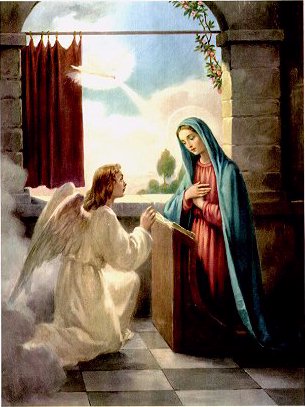 |
 |
| First Joyful Mystery - The Annunciation |
| The Angel Gabriel was sent from God to a Virgin whose name was Mary. The angel said to her, "Do not be afraid, Mary, for you have found favor with God. Behold, you will conceive in your womb and bear a Son, and you shall name Him Jesus." Mary said, "Behold, I am the hadmaid of the Lord. May it be done unto me according to Your word." (Luke 1:26-38) |
| Think of...Mary accepting God's plan for her life. |
| Spiritual Fruit - Faith |
|
Meditation
The Archangel Gabriel, whose name means "the Strength of God," has himself been saluted through all the Christian centuries as a very special archangel, trusted by God for the message which would start off the whole action of the New Dispensation.
This mystery is so easy to dramatize in one's imagination. Where did the Annunciation take place, what form did Gabriel assume, was Mary at prayer at that time, who did she first tell about the vision? The Fathers of the Church, when they comment on this passage in Luke, all add their own details. It's a fascinating occupation that anyone can attempt.
Mary's Fiat is the key to the Incarnation. Gad asks Mary's permission - and the thought occurs, she could have said "No". What would have happened then? St. Bernard pictures all the choirs of angels in heaven and the entire cast of Old Testament characters collectively holding their breath while Mary ponders.
But of course, she wouldn't say "no". Mary was so in tune with the will of God, so perfectly and completely "full of grace," that, as soon as she knew what God wanted of her, she would agree. And when she did, "The Word became flesh and dwelt among us." (John 1:14.)
There is ample food for thought in all of this, but one aspect that frequently appeals to many in this mystery, is the importance of seeking the will of God, and asking for the courage to follow it as perfectly as possible.
Source: My Rosary, Its Power and Mystery; Msgr. Charles Dollen, 1988, pp. 12-13.
|
|
|
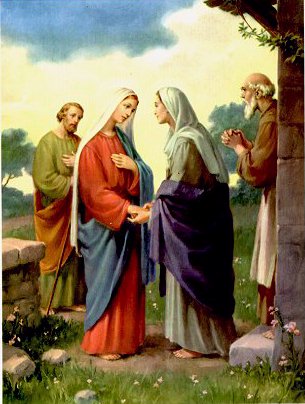 |
 |
| Second Joyful Mystery - The Visitation |
| Mary set out and traveled to a town of Judah, where she entered the house of Zechariah and greeted Elizabeth. When Elizabeth heard Mary's greeting, the infant leaped in her womb, and Elizabeth, filled with the Holy Spirit cried out in a loud voice and said, "Blessed are you among women, and blessed in the fruit of your womb! (Luke1:39-43) |
| Think of...Mary's kindness to her cousin Elizabeth. |
| Spiritual Fruit - Kindness |
|
Meditation
Mary goes with haste, or as some translate with a thoughtful heart, to the hill-country town probably about six miles from Jerusalem. Luke tells us only of the greetings between the two prophetesses, and even that little bit is filled with the spirit of Old Testament spirituality.
What patriarchs, prophets, priests and kings had longed for so many centuries was now coming into human history. What they had heard, preached and discussed every Sabbath in the synagogues was now about to happen. What they had prayed over in psalms and canticles they would now simply witness - they would be an integral part of it.
There was a fullness here over which they exulted. How their hearts and minds and words must have sung with joy and with the praises of God. It really staggers the imagination.
Mary's words in the Magnificat are a true canticle to God, witnessing to the promises fulfilled to Abraham, Jacob, Moses and David. They were also a prophecy of what the messianic age would inaugurate.
In this mystery we are invited to join as disciples with two of the first Christian believers - Mary and Elizabeth.
Source: My Rosary, Its Power and Mystery; Msgr. Charles Dollen, 1988, pp. 25-26.
|
|
|
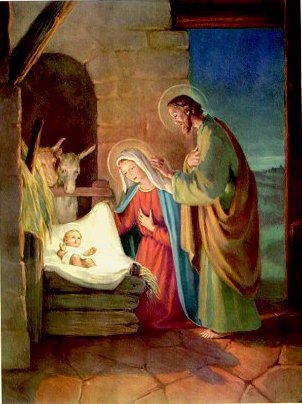 |
 |
| Third Joyful Mystery - The Birth of Jesus |
| While they were in Bethlehem, the time came for her to have her child, and she gave birth to her first-born Son. She wrapped Him in swaddling clothes, and laid Him in a manger because there was no room for them in the inn. (Luke 2:6-7) |
| Think of...Jesus born in a poor stable for love of us. |
| Spiritual Fruit - Humility |
|
Meditation
Christian ingenuity and love delights in finding ways to express the message of Christmas. It may be the stark retelling of the simple facts by St. Matthew and St. Luke or the brilliant expressions of faith by saints like St. Leo the Great and St. Bernard. It may be the theological brilliance of a Karl Adam or the dramatic meditations of Carlo Caretto, but each age has delighted in retelling the story and adding its own distinctive and devotional application.
Masterpieces by artists and the works of poets and musicians continually try to add their tribute to the Christ-Child. The Emmanual of Isaiah has become, for us, the Incarnate Son of God, a living force in history, a real presence in the Eucharist and in His Church.
But for all that 2000 years have produced, this mystery still beckons us forward. And another 2000 years will not exhaust the mystery. The central characters - Jesus, Mary and Joseph, and the supporting cast of Angels, shepherds and, a little later, the Magi - will continue to exercise their fascination.
Even that anonymous innkeeper who "had no place for them in the inn," will be the starting point for many a sermon. And the neighbors? Like women of all ages and places, they must have some to help this young mother with her first-born.
The world which could not destroy the fact of Christmas with persecution, hatred or indifference, now threatens it with an unparalleled celebration of the material. They would overwhelm Christmas with the frenzy of buying and selling gifts, and then turning off the Christmas carols as soon as the cash register bells stop ringing.
In the Rosary, we let the spirit of Christmas grow deeper and deeper in our consciousness every time we pray this mystery.
Source: My Rosary, Its Power and Mystery; Msgr. Charles Dollen, 1988, pp. 37-38.
|
|
|
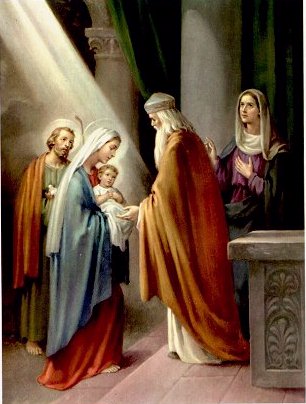 |
 |
| Fourth Joyful Mystery - The Presentation of the Child Jesus |
| Mary and Joseph took Jesus up to Jerusalem to present Him to the Lord. Simeon blessed them and said to Mary, His Mother, "Behold, this child is set for the fall and rising of many in Israel, and for a sign that is contradicted (and you yourself a sword will pierce) so that thoughts of many hearts may be revealed." (Luke 2:22-35) |
| Think of...Mary and Joseph offering Jesus to God, the Father. |
| Spiritual Fruit - Generosity |
|
Meditation
It was probably a very ordinary day in the routine of the Temple when a poor family from the outskits of Bethlehem arrived for the presentation and the purification ceremonies. Nothing special. No doubt hundreds of little families appeared that week, and some over-worked priest presided routinely over the rite.
But how easily people can misjudge. This was a very special family in which the child was the Son of God and the mother was pure above and beyond the prescriptions of the Law. Neither one needed the ceremonies to which they submitted. St. Luke is pointing out that the Holy Family was a good and God-fearing family, devoted to the fulfillment of the Law. Indeed, the Law was fulfilled in Christ, completed and finalized.
St. Paul points this out when he writes that the "plan He [God] was pleased to decree in Christ, to be carried out in the fullness of time" (Ephesians 1:10), was the fulfillment of all the promises made in the Old Testament. He adds, "But when the designated time had come, God sent forth His Son, born of a woman, born under the Law, to deliver from the Law those who were subjected to it, so that we might achieve our status as adopted sons." (Galatians 4:4-5)
At the Presentation, Christ enters the Temple for the first time where He would later proclaim it "His Father's house," as we shall see in the next mystery of the Rosary. How often He would return to teach in this place! His presence gave it a dignity that made it greater than Solomon's Temple.
The Nunc Dimittis of Simeon is a canticle of praise to the God who has fulfilled all His promises to Israel. In fact, it is a prophetic re-weaving of three verses of promises from the prophet Isiah. It also mentions at the beginning of Christ's life, that His message is not only for the Chosen Race, but for all the Gentiles, the uncircumcised, the whole world.
The "sword of sorrow" that will pierce Mary's soul has been the object of the writings of many of the Fathers and Doctors of the Church, as well as many lesser-known authors. The "sign of contradiction" is undoubtedly the cross and crucifixion, which has been a stumbling block to many. (1 Corinthians 1:23; Galatians 5:11; 1 Peter 2:8)
Among the many personal lessons we can draw from this mystery is loyalty to the law of God, especially as it presents itself in the duties of our own state in life. So many people still look for romantic or exotic or heroic ways to serve God, when the wonder and glory of it all starts with the simple and ordinary, everyday works of our lives.
The good and faithful servant who is faithful in little things, can hope for the help of God in being faithful in heroic things if they ever present themselves.
Source: My Rosary, Its Power and Mystery; Msgr. Charles Dollen, 1988, pp. 48-50.
|
|
|
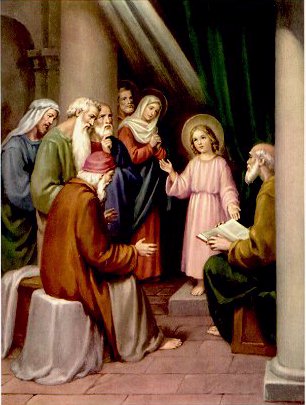 |
 |
| Fifth Joyful Mystery - The Finding of the Child Jesus in the Temple |
| When Jesus was twelve years old, His parents went up to Jerusalem for the feast of Passover. As they were returning home, the boy Jesus remained behind. After three days, they found Him in the temple. Jesus went down with them to Nazareth, and was obiedent to them. And Jesus increased in wisdom and in stature, and in favor with God and man. (Luke 2:41-5) |
| Think of...Jesus as a boy preparing for the work His Father gave Him. |
| Spiritual Fruit - Wisdom |
|
Meditation
Once again, the Holy Family is just an inconspicuous part of a devout Jewish throng who appear before the Lord on a Passover feast. They are fulfilling the Law of the Lord with commendable piety.
This was probably Our Lord's first return to the Temple since the Presentation, and, as might be expected of a young Jew, He was impressed, even overwhelmed by the glories of the Temple and all that it signified. That He would be tempted to stay and give His whole life to God could be expected.
But of course, He was more than just an impressionable young fellow and Joseph and Mary knew that. When He was missing from the returning caravan, they probably had very divided hearts as they rushed back to Jerusalem. The first and natural thought would be, "What could have happened to Him?" All parental hearts fear the worst in an emergency.
But since they knew His origin, did they perhaps think that He was about to go public, begin His work, overcome with a sort of Divine impatience? Their common sense would have told them it was premature. Even when He finally began, He was only about thirty, and considered almost too young to be a Teacher in Israel.
They must have suspected that it was in some way connected with the reason for His birth, but the suspense must have been awful. Indeed, it was the occasion to drive home to Mary and Joseph, and through them to us, that He was always conscious of the purpose of His Incarnation - to do the work of His Father, God.
And after the lesson was taught, He went back to Nazareth and was subject to them. I think St. Bernard's meditation on the phrase, "He was subject to them," sums up completely all the patristic comment on this passage. On the devotional level, could we ask for a more dramatic lesson on humility and obedience?
The saints also love that small phrase, that Mary kept all these things in her heart, pondering over them, meditating about them. Any mother can tell you in detail, example after example, of the things her children did and said as they were growing up. She can go on for hours with very little prompting.
Mary knew a bigger and greater secret about her Son. How she must have pondered all of His words and deeds, seeing in them the fulfillment of prophecy and of things to come. It seems compelling to me, that Mary was the source of St. Luke's infancy narrative, even though modern critics like to discount that. I think the details are too clear and too genuine to have come to him second or third hand. Mary treasured these things in her heart!
That thought gives us new perspective on devotion to the Immaculate Heart of Mary. What treasures were stored there!
Source: My Rosary, Its Power and Mystery; Msgr. Charles Dollen, 1988, pp. 60-61.
|
Return to the Mysteries of the Rosary
|
|